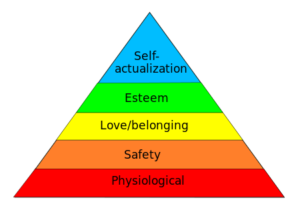 Over the years, multiple psychologists have delineated the “stages of life.” Dr. Thomas Armstrong has 12. Mark Manson has four. Others claim there are five or eight. In all models, there is a phase in our lives when we separate from our parents, go out in the world, and acquire. We acquire skills, possessions, money, reputations, relationships, and more. In this stage (roughly 25–45 years of age, depending on which model you’re using), we are responsible for making ourselves into what we are going to be. And it’s full of frustration and expectation.
Over the years, multiple psychologists have delineated the “stages of life.” Dr. Thomas Armstrong has 12. Mark Manson has four. Others claim there are five or eight. In all models, there is a phase in our lives when we separate from our parents, go out in the world, and acquire. We acquire skills, possessions, money, reputations, relationships, and more. In this stage (roughly 25–45 years of age, depending on which model you’re using), we are responsible for making ourselves into what we are going to be. And it’s full of frustration and expectation.
By nature, the acquisition phase involves trial and error, false starts, and frustration. That’s how we learn. And while frustration is key to making changes in our environments, expectation seems to be the foundation of all frustration. So expectations are inherent in this period.
We have expectations of driving faster and better on the next rally. Expectations of creating a better life than our parents had. Expectations of reaching certain goals in our business and professional lives. Expectations in our relationships. Expectations regarding our feelings of self-worth. Expectations of happiness. And, in some parts of the world, expectations of having food and a roof over our heads.
Our expectations mirror Maslow’s hierarchy of needs, from physiological needs to self-actualization. We all work to move ourselves up that hierarchy. Some of us start the trek earlier than others (think Elon Musk and Steve Jobs). Some get stuck mid-hierarchy (think middle managers in corporate America just trying to get their piece of the pie and that corner office). Some never progress much above basic physiological needs. At each step, there are expectations. And those expectations lead to frustration. We either recommit to the path up the hierarchy, or we give up.
Reaching the next stage
At some point, the acquisition phase is followed by one of “contemplation” (Armstrong’s model, but the basic idea is found in all models). This is a time when our expectations are tempered, as is our frustration. We may see that the top of the hierarchy is not reachable in the time we have left. Or we may simply be satisfied and happy where we are. For any number of reasons, we start to pare back our expectations and realize that life without so many frustrations is enjoyable.
Armstrong speaks of this “contemplation” stage:
After many years in young adulthood of following society’s scripts for creating a life, people in midlife often take a break from worldly responsibilities to reflect upon the deeper meaning of their lives, the better to forge ahead with new understanding. This element of contemplation represents an important resource that we can all draw upon to deepen and enrich our lives at any age.
For those of us who try to impart the concept of the value of being “present” in our daily existence, this contemplative stage is one where we truly connect to the reality of life. In some cases, we see that we’ve stayed too long at the dance. Perhaps we made decisions that did not serve us well. And again, maybe it’s that our time to get this right is getting shorter, but fretting over our violated “rules of life” no longer seems valuable.
You may have noticed that our nurseries and preschools are full of black and white children playing and learning together. As these youngsters grow and task themselves with meeting expectations, they often find themselves competing for resources (teachers’ time, jobs, paths to higher education), and members of these populations seem to separate and see each other as adversaries.
Been to a nursing home lately? It looks like a preschool program, only the kids are between 85 and 95. We come back together when we get away from acquiring. Involved in “contemplating,” we tend to be more tolerant, forgiving, and collegial.
Any of you readers recognize that your tolerance has increased as you age? Have you discovered that your expectations aren’t as rigid as they used to be? Are you happier as you “let go” of some of the energy you used to invest in “acquiring”? I’d love to hear your stories.



